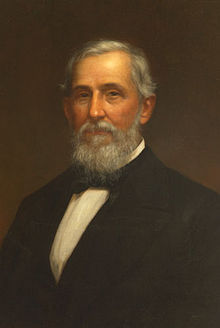David Shelby Walker
| David Shelby Walker | |
|---|---|
 |
|
| 8th Governor of Florida | |
|
In office January 18, 1866 – July 4, 1868 |
|
| Lieutenant | William W. J. Kelly |
| Preceded by | William Marvin |
| Succeeded by | Harrison Reed |
| Member of the Florida House of Representatives | |
|
In office 1848 |
|
| Member of the Florida State Legislature | |
|
In office 1845 |
|
| Personal details | |
| Born | May 2, 1815 Kentucky |
| Died | July 20, 1891 (aged 76) Tallahassee, Florida |
| Political party |
Conservative [Democratic] Party Constitutional Unionist Know Nothing Whig |
| Spouse(s) | Philoclea Alston Elizabeth Duncan |
| Parents | David Walker |
David Shelby Walker (May 2, 1815 – July 20, 1891) was the eighth Governor of Florida, serving from 1866 to 1868.
Walker was born near Russelville in Logan County, Kentucky. He attended private schools in Kentucky and Tennessee and studied law. He moved to Florida in 1837, settling in Leon County. His father was David Walker, a prominent early Kentucky politician who served in the US House of Representatives. David S. Walker was a cousin and close business and political confidante of Florida territorial governor Richard K. Call. He was also related to Florida Senator Wilkinson Call, who was Walker's law partner for several years in the 1850s and 1860s in Tallahassee.
Walker entered politics as a Whig, and was elected to the first session of the Florida State Legislature in 1845, serving Wakulla and Leon Counties as Senator. In 1848, he was elected by Leon County to the Florida House of Representatives. In 1849 he was appointed Register of Public Lands and was ex officio State Superintendent of Public Instruction, positions he held until 1854. He advocated and promoted interest in public schools. His efforts resulted in the creation of public schools in Tallahassee. He served as Mayor of Tallahassee. He was the Know Nothing gubernatorial candidate in 1856, but lost to Democrat Madison S. Perry by 2.6 points. In 1859, he became a Florida Supreme Court Justice.
Prior to the Civil War, Walker was a Constitutional Unionist and so had opposed secession. However, when Florida seceded from the Union in 1861, he supported his state. Following the war, on November 29, 1865, Walker was elected governor unopposed, in an election in which newly freed slaves were not allowed to participate. He was inaugurated on December 20 and took office January 18, 1866.
...
Wikipedia
